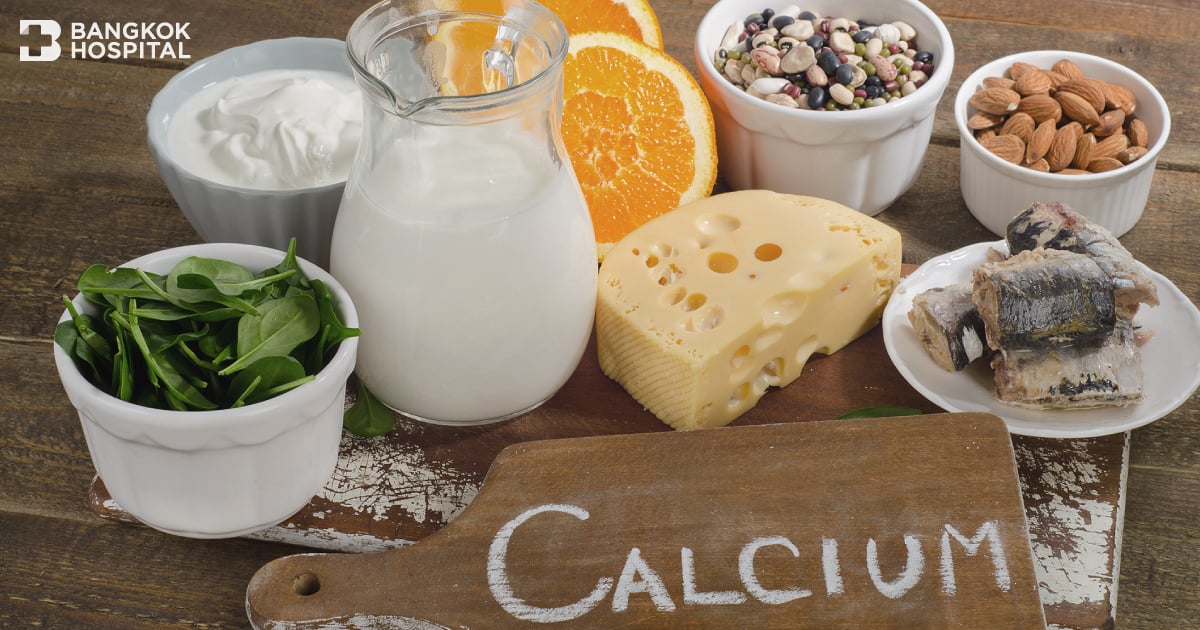Calcium has many benefits, so getting to know calcium is something we should pay attention to.
What You Need to Know About Calcium
- The body cannot synthesize calcium on its own. Calcium can be obtained from 2 sources, namely
- Food such as milk, dried shrimp, shrimp paste, small fish, mackerel, oysters, dark green leafy vegetables (kale, moringa leaves, betel leaves), black sesame, etc.
***Limitations in some people who are allergic to milk (bloating, diarrhea), eating oysters and fried fish is risky for high blood fats - Supplements have 3 types based on the ‘last name’ such as
- Calcium ‘Carbonate’ absorbed by 10%, causes bloating, constipation
- Calcium ‘Citrate’ absorbed by 50%, must be taken with food (works only when there is acid in the stomach)
- Calcium ‘L theonate’ absorbed by 90%, can be taken on an empty stomach
- Food such as milk, dried shrimp, shrimp paste, small fish, mackerel, oysters, dark green leafy vegetables (kale, moringa leaves, betel leaves), black sesame, etc.
- The amount of calcium the body should receive at each age
- Under 40 years 800 mg/day = 3 – 4 glasses of milk
- Menopause (~50 years) 1000 mg/day = 4 – 5 glasses of milk
- Pregnant women, age > 60 years 1200 mg/day = 6 – 7 glasses of milk
- Women have a 30 – 40% chance of fractures from osteoporosis compared to 10% in men
- The first 10 years after menopause, bones thin very quickly due to the lack of female hormones or Estrogen. Therefore, supplementing Calcium is essential to help increase bone density and prevent osteoporosis.
- Problems with people who buy calcium to eat by themselves
- Taking poorly absorbed types of calcium, leading to symptoms of bloating, constipation
- Taking more than necessary, leading to the accumulation of calcification in the breast, kidney, blood vessels
- Absorption depends on the type of calcium you choose to consume
**Must be supplemented with Vitamin D together because Vitamin D is like a partner of calcium, helping the intestines absorb calcium better
**Should not take calcium with- Some antibiotics (Tetracycline, Quinolone)
- Some blood pressure medicines (Thiazide Diuretics, Calcium Channel Blocker eg Nifedipine, Diltiazem, Verpamil)
- Calcium will inhibit the action of these drug groups
- Should not consume more than 1500 mg of calcium per day
- Consult your regular doctor before choosing to take it
- Taking too much calcium
If calcium is taken in excess amounts leading to accumulation, it increases the risk of kidney stones, breast calcification, breast cancer, vascular calcification, and arterial occlusion. - Choose easily absorbed types of calcium
Consuming calcium should choose easily absorbed types with minimal side effects and must be taken along with Vitamin D
Risk Factors for Calcium Deficiency
Other risk factors that result in calcium deficiency in the body include
- Not consuming enough calcium
- Lack of exercise
- Overconsumption of coffee
- Excessive alcohol consumption
- Lack of Estrogen hormone before menopause such as having both ovaries surgically removed
- Having a small physique
- Family history of osteoporosis or fractures from osteoporosis
- Having had fractures before





